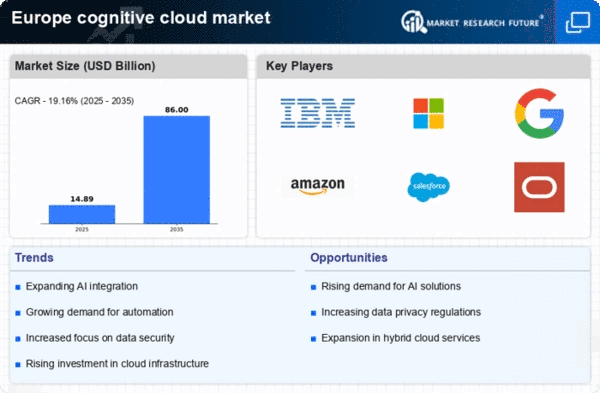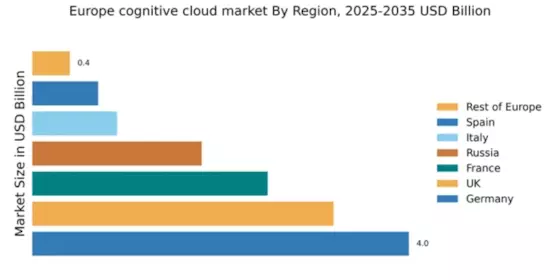Germany : Germany's Robust Market Growth
Germany holds a commanding 4.0% market share in the cognitive cloud sector, valued at approximately €1.2 billion. Key growth drivers include a strong emphasis on digital transformation, supported by government initiatives like the Digital Strategy 2025. Demand for AI-driven solutions is surging, particularly in manufacturing and automotive sectors, as companies seek to enhance operational efficiency. Regulatory frameworks are evolving to support innovation while ensuring data protection, fostering a conducive environment for cloud adoption.
UK : Innovation and Investment Drive Growth
The UK boasts a 3.2% market share in the cognitive cloud market, translating to around €960 million. The growth is fueled by significant investments in AI and cloud infrastructure, particularly in London and Manchester. Demand for cloud-based solutions is rising across finance and healthcare sectors, driven by the need for data analytics and improved customer experiences. Government policies, such as the UK AI Strategy, are enhancing the regulatory landscape, promoting innovation while addressing ethical concerns.
France : Strategic Investments in AI
France captures a 2.5% market share in the cognitive cloud market, valued at approximately €750 million. The growth is propelled by strategic investments in AI and cloud technologies, particularly in Paris and Lyon. Demand is increasing in sectors like retail and logistics, where companies are leveraging cloud solutions for enhanced operational efficiency. The French government is actively promoting digital transformation through initiatives like the France 2030 plan, which aims to boost innovation and competitiveness.
Russia : Expanding Market Opportunities
Russia holds a 1.8% market share in the cognitive cloud market, valued at around €540 million. Key growth drivers include increasing digitalization across various sectors, particularly in Moscow and St. Petersburg. Demand for cloud solutions is rising in telecommunications and energy sectors, as companies seek to optimize operations. Government initiatives, such as the Digital Economy Program, are fostering a supportive regulatory environment, encouraging investment in cloud technologies and infrastructure development.
Italy : Focus on Digital Transformation
Italy accounts for a 0.9% market share in the cognitive cloud market, valued at approximately €270 million. The growth is driven by a focus on digital transformation, particularly in cities like Milan and Rome. Demand for cloud solutions is increasing in sectors such as fashion and manufacturing, where companies are adopting AI for enhanced customer engagement. Government initiatives, including the National Plan for Digital Transformation, are promoting cloud adoption and innovation across industries.
Spain : Innovative Solutions for Growth
Spain has a 0.7% market share in the cognitive cloud market, valued at around €210 million. The growth is fueled by increasing adoption of cloud technologies, particularly in Barcelona and Madrid. Demand is rising in sectors like tourism and retail, where businesses are leveraging cloud solutions for improved customer experiences. The Spanish government is supporting digital initiatives through programs like the Digital Spain 2025 agenda, which aims to enhance the country's digital infrastructure and capabilities.
Rest of Europe : Emerging Markets and Trends
The Rest of Europe holds a 0.4% market share in the cognitive cloud market, valued at approximately €120 million. Growth is driven by emerging markets in Eastern Europe, where digital transformation is gaining momentum. Demand for cloud solutions is increasing across various sectors, including healthcare and education. Local governments are implementing supportive policies to encourage cloud adoption, fostering a favorable business environment for innovation and investment in technology.

















